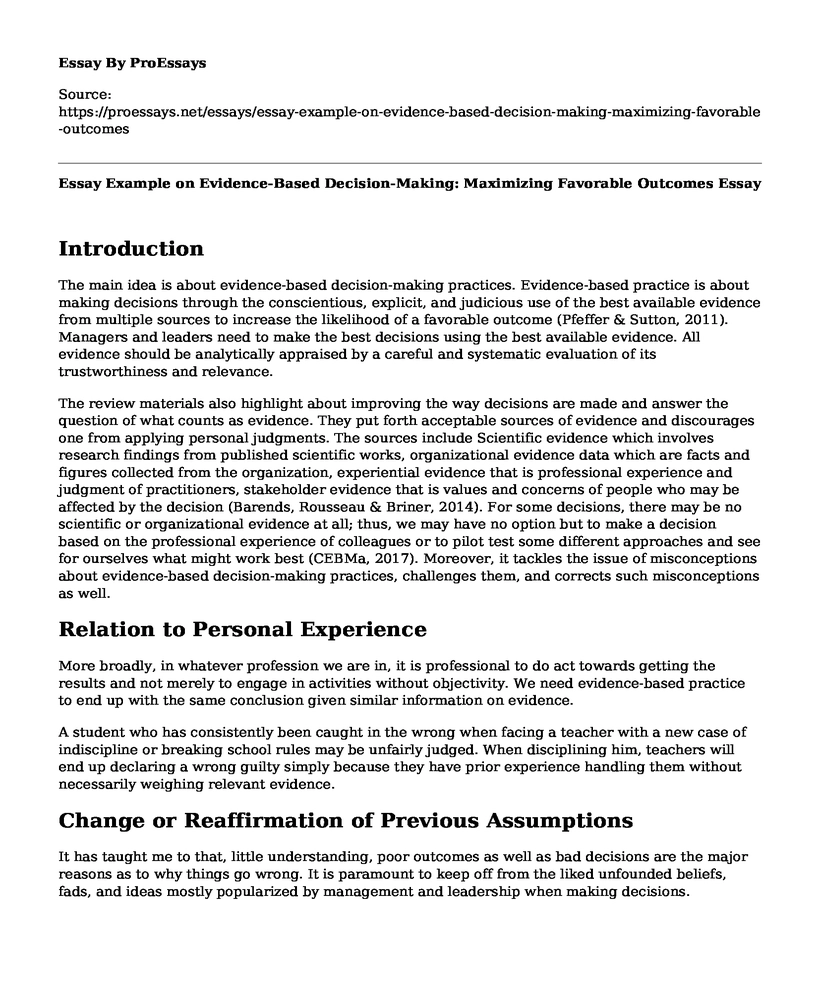Introduction
The main idea is about evidence-based decision-making practices. Evidence-based practice is about making decisions through the conscientious, explicit, and judicious use of the best available evidence from multiple sources to increase the likelihood of a favorable outcome (Pfeffer & Sutton, 2011). Managers and leaders need to make the best decisions using the best available evidence. All evidence should be analytically appraised by a careful and systematic evaluation of its trustworthiness and relevance.
The review materials also highlight about improving the way decisions are made and answer the question of what counts as evidence. They put forth acceptable sources of evidence and discourages one from applying personal judgments. The sources include Scientific evidence which involves research findings from published scientific works, organizational evidence data which are facts and figures collected from the organization, experiential evidence that is professional experience and judgment of practitioners, stakeholder evidence that is values and concerns of people who may be affected by the decision (Barends, Rousseau & Briner, 2014). For some decisions, there may be no scientific or organizational evidence at all; thus, we may have no option but to make a decision based on the professional experience of colleagues or to pilot test some different approaches and see for ourselves what might work best (CEBMa, 2017). Moreover, it tackles the issue of misconceptions about evidence-based decision-making practices, challenges them, and corrects such misconceptions as well.
Relation to Personal Experience
More broadly, in whatever profession we are in, it is professional to do act towards getting the results and not merely to engage in activities without objectivity. We need evidence-based practice to end up with the same conclusion given similar information on evidence.
A student who has consistently been caught in the wrong when facing a teacher with a new case of indiscipline or breaking school rules may be unfairly judged. When disciplining him, teachers will end up declaring a wrong guilty simply because they have prior experience handling them without necessarily weighing relevant evidence.
Change or Reaffirmation of Previous Assumptions
It has taught me to that, little understanding, poor outcomes as well as bad decisions are the major reasons as to why things go wrong. It is paramount to keep off from the liked unfounded beliefs, fads, and ideas mostly popularized by management and leadership when making decisions.
Importance
Evidence-based decision making is critical. It increases the likelihood of achieving desired results. The essential learning point is that evidence-based practice always starts with a proper mindset (CEBMa, 2017). It involves questioning assumptions, especially where a person declares a belief as a fact. So, we should always ask: 'What is the evidence for that?', 'How trustworthy is it?' and 'Is this the best available evidence?'
How to Utilize the Information as a Leader
As a leader in my organization, in utilizing this information, I would improve the decisions I make and that of the whole organization by engaging in effective evidence-based practices. Therefore, in decision making, I would first start by asking practical questions regarding an issue or a problem (Decision Innovation, 2020). Secondly, acquiring information through systematically searching for and recovering the evidence. Thirdly, appraising of information by critically judging the trustworthiness and relevance of the evidence. Followed by aggregating the information by weighing and compiling the evidence. And lastly, incorporating the evidence into the decision-making process before assessing and evaluating the outcome of the decision taken.
What Surprised Me
The one thing that surprised me was the misuse of evidence. Evidence is misused by people who often make a decision first and then move on to find evidence to justify the decision. It loses the opportunity to learn from the decision as it closes off the review of non-conforming evidence. Problems can arise, particularly when evidence misuse occurs as part of a group decision making. Commitment to decision implementation could, therefore, be reduced when stakeholders fully recognize dishonesty in the process.
References
Barends, E., Rousseau, D. M., & Briner, R. B. (2014). Evidence-Based Management. The Basic Principles. https://www.cebma.org/wp-content/uploads/Evidence-Based-Practice-The-Basic-Principles.pdfCEB
Ma. (2017). YouTube [Video]. YouTube. https://www.youtube.com/watch?v=nwK7IgmygBc
Decision Innovation. (2020). Evidence Based Decision Making. Decision Making Solutions - Managed Decisions. Innovative Solutions. https://www.decision-making-solutions.com/evidence-based-decision-making.html
Pfeffer J., & Sutton R. (2011, September 4). Trust the Evidence, Not Your Instincts. The New York Times - Breaking News, World News & Multimedia. https://www.nytimes.com/2011/09/04/jobs/04pre.html
Cite this page
Essay Example on Evidence-Based Decision-Making: Maximizing Favorable Outcomes. (2023, Apr 07). Retrieved from https://proessays.net/essays/essay-example-on-evidence-based-decision-making-maximizing-favorable-outcomes
If you are the original author of this essay and no longer wish to have it published on the ProEssays website, please click below to request its removal:
- Hospital Management Strategies by Ronald A. Nykiel
- Essay on the Corporate and Cultural Visits to Panama
- People and Task-Centered Recommendations for Minimizing Resistance to Change
- Ethical Dilemmas and Ethical Decision Making Essay
- Baylor Scott and White Security Measures Paper Example
- Paper Example on 19-Year-Old Paralyzed After Trampoline Park Accident
- Essay on Johnson & Johnson: Overcoming Challenges for Improved Performance







